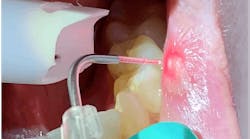Thursday Troubleshooter: Dentist in Egypt asks, group or solo practice?
QUESTION: I'm a dentist in Egypt who is at a crossroads. I have rented a practice for the last 13 months, but due to many reasons I’ve been losing money and been incredibly overwhelmed and stressed. As for having a strong mentor as I’ve read in many articles, I never had one and it's pretty difficult to be on my own, but I took the risk and decided to depend on myself. The very short time I spent working for others never exceeded three months, and it was only part time as I never wanted to go on, nor was I feeling welcomed as a team player.
Due to many reasons, like my country's economic, political, and social statuses, it's really hard to act against everything all at once. The good side, however, is that education here is free and we don't have debts, at least those of us who study at public universities. The other good thing is that I achieved some personal goals from one year in my practice experience.
My current dilemma is that I want to leave this practice due to many reasons, some of which I mention here. My question is, what do you think is better for someone in my position — to start over fresh at a new place, keeping in mind the correction of previous mistakes and mishaps, or simply search for a job at a group environment due to not having a mentor?
This is my second term in an oral surgery specialty program here in Egypt. Also, I am not satisfied with the education here and it's always been my dream to get a quality education where a goal for science, teamwork, professionalism, support, and technology can be reached. I have put a lot of effort into trying to be effective and efficient wherever I am. One last thing — I do love this profession.
ANSWER FROM ROBIN MORRISON,RLM Healthcare Marketing & Consulting, Inc:
In answer to your specific question (start over fresh or look for a group environment), I would suggest searching for a practice in which you would have the opportunity to work with a mentor. Clearly, the key is locating the right mentor for you. Working with a committed mentor offers tremendous benefits, including gaining important experience at an increased rate.
I encourage recent dental grads to find a dentist who does the finest dentistry in their community, and offer to work for them for two years in a mentorship program. I also tell them not to worry about making the “big bucks” during those two years, because the education they will receive under an excellent mentor in two years would take them 10 years if they struggled on their own. I believe a mentorship program is a win-win for both parties. The mentoring dentist has an eager mentee who is carrying part of the load in the practice (maybe at a time when he or she would like to slow down), and the mentee is learning from the best, gaining invaluable experience.
ANSWER FROM SUSAN KULAKOWSKI, DDS Consulting, LLC:
Without specifics regarding the current practice and the reasons for leaving, it’s difficult to make a recommendation. The previous 13 months, even with its challenges and frustrations, has surely been a tremendous learning and growth experience, and as stated, it enabled you to achieve specific personal goals and hopefully provided professional fulfillment. It’s difficult for a dentist to provide excellent patient care, manage the patients and staff, and still run the practice as a healthy business. Your practice would have benefited greatly from the help of a management coach, provided that is an option in your country.
With expert guidance there would have been significantly less stress and anguish. The practice would have realized a greater level of productivity much more quickly as a result of organization through systems management, a higher level of communication, and excellent service. Without those things, starting over in a new practice, even taking into consideration what you’ve learned through your experience, may not be an advantage. Unless there are specific circumstances necessitating a move, such as a contract, lease renewal agreement or expiration, facility constraints, or demographics, starting over fresh without making necessary changes may simply be shifting existing management problems to a new practice.
Deciding on a solo or group practice is a personal preference based on a dentist's individual desires and goals. Each has advantages and disadvantages.
A group practice can provide the opportunity to mentor and be mentored both in a clinical and business sense, along with an ability to share the joys and challenges of dentistry. Many group practitioners appreciate having colleagues within the practice to share, consult with, provide recommendations, and gain knowledge through mutual support. A group practice shares the management responsibilities required to run a successful practice through effective systems management, personnel management, budgeting, marketing, facility improvement, technology, and continuing education. The distribution of the management duties and responsibilities can make it less stressful, provided they are shared equally. An unequal distribution of duties and responsibilities creates major problems.
The doctor communication must be high. Ineffective doctor-to-doctor communication contributes to leadership issues. There must be strong, positive, and united leadership and a high level of teamwork. You stated you’ve worked in group practices briefly without success. In addition to effective communication and equally shared duties and responsibilities, in order for the associate relationship to be successful, the philosophy and goals of the practice must be congruent with the individual doctor's philosophy and goals. If they don’t match, the doctor and practice is setting itself up for probable failure.
However, bigger is not always better, and can actually contribute to greater management headaches. The more doctors and team members in a practice, the more the challenges there can be. There is greater potential for communication and system breakdowns, which results in diminished practice efficiency, increased conflict, and greater staff management issues.
A solo practitioner determines his or her practice vision and goals and makes revisions as desired. All clinical and management decisions are compromise-free. Personnel selection and staffing, patient and practice policies and protocol, procedures and materials, equipment, budgeting, internal and external marketing projects, facility and technology improvements, and continuing education are all at the doctor's sole discretion. The dentist maintains full control of his or her own practice.
Your strong passion for dentistry, thirst for quality education, and excellent clinical skills is commendable. Best wishes to you in whatever path you choose.
PAST THURSDAY TROUBLESHOOTERS:
If they opt out, can this practice accept ANY Medicare plans?
How can young dental office manager gain respect?
New boss is bad news for prison dental professional
Send your questions for the experts to answer. Responses will come from various consultants associated with Speaking Consulting Network, Academy of Dental Management Consultants, or Dental Consultant Connection. Their members will take turns fielding your questions on DentistryIQ, because they are very familiar with addressing the tough issues. Hey, it's their job.
Send your questions to [email protected]. All inquiries will be answered anonymously every Thursday here on DIQ.







